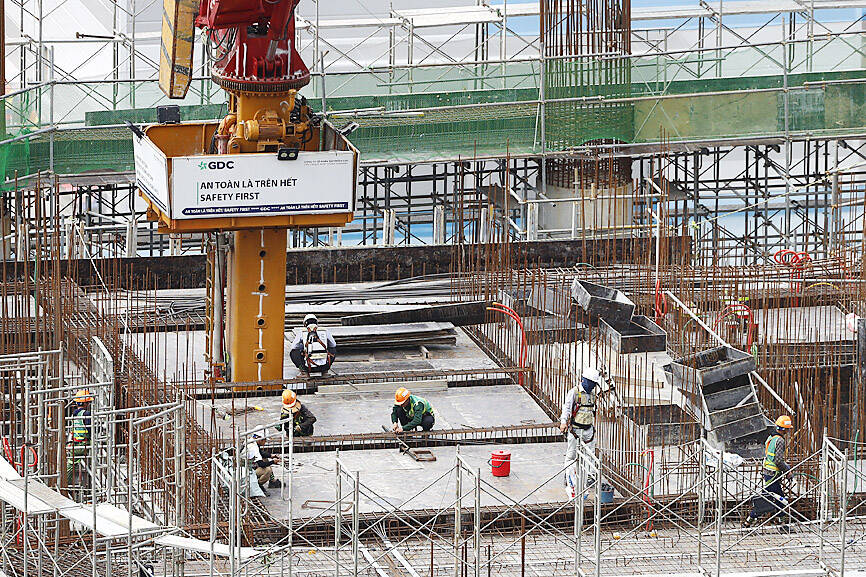Vietnam has missed out on multibillion-dollar investments by multinationals including Intel Corp and LG Chem Ltd because it lacks sufficient investment incentives, the Vietnamese Ministry of Planning and Investment said in a document reviewed by Reuters.
US chipmaker Intel had proposed to invest US$3.3 billion in a project in Vietnam and asked the country for “cash support” of 15 percent, but later decided to move the project to Poland, the ministry said in the document dated on June 29.
South Korea’s LG Chem also skipped Vietnam to invest in a battery project in Indonesia, after having asked the Vietnamese government to cover 30 percent of the investment cost, the document said.

Photo: EPA-EFE
“Recently, many large groups have come to explore investment opportunities in Vietnam, but have later decided to move to other countries as Vietnam lacks regulations on investment supports,” the document said.
Vietnam, which is an important manufacturing base for companies such as Samsung Electronics Co, Foxconn Technology Group (富士康科技集團) and Intel, is heavily reliant on foreign investment for growth. Companies with foreign investment account for about 70 percent of its total exports.
The ministry document also showed that Intel had shelved a planned investment in Vietnam that could have nearly doubled the US chipmaker’s operation in the Southeast Asian country.
The document added that Austria-based semiconductor manufacturer AT&S had decided to invest in Malaysia after its request for investment support in Vietnam was not met.
Samsung was also planning to move some production to India, the document said.
Multinationals have been watching Vietnam's plans to set up the investment incentive fund after the country's parliament last year approved the OECD-led global minimum corporate tax rate of 15 percent, raising the effective tax level paid by companies.
Nonetheless, Vietnam’s economic growth is accelerating and could meet or exceed the government’s 6.5 percent target this year, Minister of Planning and Investment Nguyen Chi Dung said.
Dung said economic expansion might reach 7 percent this year as improving industrial and construction sectors drive growth, a government statement said.
The IMF has forecast Vietnam’s GDP to expand 6 percent this year, up from 5 percent last year — a pace that would make it among Asia’s fastest-growing economies.
The economy is also benefiting from increasing exports and foreign direct investment (FDI), Dung said.
Pledged FDI for the year might reach US$39 billion to US$40 billion, up from last year, Deputy Minister of Planning and Investment Tran Quoc Phuong said.
The country posted pledged FDI at US$36.6 billion as of December last year.
Additional reporting by BloomberG

KEEPING UP: The acquisition of a cleanroom in Taiwan would enable Micron to increase production in a market where demand continues to outpace supply, a Micron official said Micron Technology Inc has signed a letter of intent to buy a fabrication site in Taiwan from Powerchip Semiconductor Manufacturing Corp (力積電) for US$1.8 billion to expand its production of memory chips. Micron would take control of the P5 site in Miaoli County’s Tongluo Township (銅鑼) and plans to ramp up DRAM production in phases after the transaction closes in the second quarter, the company said in a statement on Saturday. The acquisition includes an existing 12 inch fab cleanroom of 27,871m2 and would further position Micron to address growing global demand for memory solutions, the company said. Micron expects the transaction to

Vincent Wei led fellow Singaporean farmers around an empty Malaysian plot, laying out plans for a greenhouse and rows of leafy vegetables. What he pitched was not just space for crops, but a lifeline for growers struggling to make ends meet in a city-state with high prices and little vacant land. The future agriculture hub is part of a joint special economic zone launched last year by the two neighbors, expected to cost US$123 million and produce 10,000 tonnes of fresh produce annually. It is attracting Singaporean farmers with promises of cheaper land, labor and energy just over the border.

US actor Matthew McConaughey has filed recordings of his image and voice with US patent authorities to protect them from unauthorized usage by artificial intelligence (AI) platforms, a representative said earlier this week. Several video clips and audio recordings were registered by the commercial arm of the Just Keep Livin’ Foundation, a non-profit created by the Oscar-winning actor and his wife, Camila, according to the US Patent and Trademark Office database. Many artists are increasingly concerned about the uncontrolled use of their image via generative AI since the rollout of ChatGPT and other AI-powered tools. Several US states have adopted

A proposed billionaires’ tax in California has ignited a political uproar in Silicon Valley, with tech titans threatening to leave the state while California Governor Gavin Newsom of the Democratic Party maneuvers to defeat a levy that he fears would lead to an exodus of wealth. A technology mecca, California has more billionaires than any other US state — a few hundred, by some estimates. About half its personal income tax revenue, a financial backbone in the nearly US$350 billion budget, comes from the top 1 percent of earners. A large healthcare union is attempting to place a proposal before